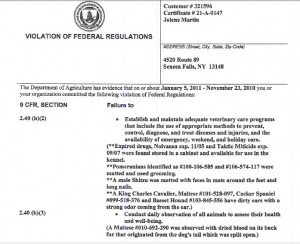
Tonight the Gorham Town Board will hear from residents about the proposed wholesale commercial dog breeding facility proposed by breeders Curtis and Jolene Martin. The couple currently own a facility in Varick, NY where they breed roughly 300-400 dogs. (If you’re behind, here are the posts about the proposed facility in Gorham, NY.)
Over the last few days, I’ve listened while radio talk show hosts and even news reporters have mentioned the Martin’s USDA violations at their Seneca County facility. One radio host said they were few and minor, and accused those in opposition of the facility of being guilty of destroying a business that puts food on the Martin’s table. A news report from a local TV station today mentioned that the Martins have had numerous violations, but said they were “mostly for record keeping.”
The last thing I want to do is fan the flames of this highly emotional, and now national, story. But I’ve read the USDA Animal and Plant Health Inspection Service (APHIS) reports and they are not minor.
In fact, I’d argue that they show a pattern of neglect to care for the dogs who produce puppies that then go on to live in people’s homes.
To be fair, it’s not unusual for the USDA to find a violation when they come to do an inspection anywhere. Something is dirty, something needs to be fixed. What you’re looking for is a pattern of violations that raise red flags. For example, if you found out your favorite ice cream parlor had been cited repeatedly for one employee’s failure to wash their hands? It sounds minor, but that’s how serious (and disgusting) diseases are spread. If the owner fails to correct it, then that tells you something about how they run their business. (Note: I know the USDA doesn’t inspect your local ice cream parlor. I’m just making an analogy.)
Since we’re dealing with living animals, it’s even more important to make sure that all of the ducks are in a row, so to speak. These are living, breathing creatures who will produce living, breathing creatures. If you get a bad toaster, you can go back to the manufacturer. Get a bad puppy? Much bigger problems, for you and the dog.
For example, repeated citations for inaccurate record keeping are not minor. Puppies from commercial facilities like this are notorious for genetic defects; if the breeder can’t keep accurate records of which dogs he has in his facility and are being bred to each other, or are using breeding dogs from unlicensed dealers (both violations the Martins have been cited for), they can’t expect to pay attention to the other aspects of breeding that produce a quality product.
If you consider a puppy a product, that is.
Feces in the feeders. Treating dogs with expired medications. Dogs with untreated injuries. A breeding bitch on loan from another facility that was so malnourished her ribs, spine and pelvic bones were clearly obvious to the inspector. Accumulation of rodent droppings in empty whelping boxes. Dogs with fur matted with dirt and feces. Dogs with untrimmed nails – which seems minor, until you realize that these dogs are standing 24/7 on wire mesh floors of their crates. Untrimmed nails can grow into the paw pad and get caught on the wire mesh. (more…)









